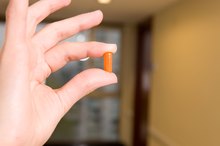Low Vitamin D & B12 Deficiency
Vitamins generally should be supplied by the diet, although there are some, such as vitamin D, that the body can produce naturally through sun exposure. A deficiency of vitamins may be dietary in origin or due to secondary causes, such as improper absorption. A deficiency of vitamins D or B12 can result in serious health complications, and low levels of either of these vitamins are characterized by a unique set of symptoms.
Vitamin D
Vitamin D maintains normal levels of calcium and phosphorus in your blood. Two sources of vitamin D exist: the skin and diet. In the presence of sunlight, your skin can produce about 80 percent of the vitamin D that you need. The remainder must be obtained from dietary sources, which include deep-sea fish, fortified cereals, plant sources such as kelp and supplements.
Vitamin B12
Signs & Symptoms of Vitamin B-12 & Vitamin D Deficiencies
Learn More
Vitamin B12 is required in your body for two essential enzyme reactions involved in the metabolism of proteins and fats. Specifically, vitamin B12 promotes the synthesis of oxygen-carrying red blood cells and the proper function of nervous tissue. The daily requirement is 2 to 3 milligrams. A balanced diet contains significantly larger amounts and normally results in accumulation of vitamin B12 in sufficient quantities to last for several years.
Vitamin D Deficiency
Rickets in growing children and osteomalacia in adults are skeletal diseases caused by a deficiency of vitamin D and characterized by bowed limbs and weak bones. In developed countries, these diseases are rarely a result of dietary deficiencies. However, both young adults and the elderly can develop deficiencies in winter due to inadequate sun exposure, and low vitamin D levels lead to low calcium levels, which manifests as a convulsive state of continuous muscle contraction, known as tetany.
Vitamin B12 Deficiency
Vitamin C in Mangoes
Learn More
Vitamin B12 is essential to proper function of blood cells and nervous tissue, and deficiencies lead to a condition known as combined system disease. It is characterized by the development of anemia, combined with nervous system dysfunction. Symptoms include abnormal sensations, such as tingling and numbness, weakness of the extremities, and may involve clumsiness, depression and an altered mental state. Symptoms of anemia include pallor, weakness, heart palpitations and anxiety.
Causes of Low Vitamin D
Although inadequate sunlight is the most common cause of vitamin D deficiency in developed countries, many diseases of the gastrointestinal system can result in decreased absorption of the vitamin and result in deficiencies. These include liver disease, pancreatic insufficiency, biliary tract obstruction and celiac sprue, also known as gluten sensitivity. Gluten is a protein found in grains such as rye, barley and wheat.
Causes of Low Vitamin B12
Because vitamin B12 requires a chemical known as intrinsic factor, which is produced by the stomach, stomach disorders such as atrophic gastritis, or shrinking and inflammation of the stomach, can lead to improper absorption of B12 and result in deficiency. Fish tapeworms, pregnancy, hyperthyroidism and advanced cancer are other, less common, causes of vitamin B12 deficiency.
Tips
In order to avoid deficiencies in either of these important vitamins, eat a well-balanced diet and choose from a variety of foods. Aim to get 20 to 30 minutes of sunlight three or four times a week, which helps your body produce adequate vitamin D in summer months. In the winter, consider supplementing your diet with vitamin D in pill form. Vitamin B12 sources for vegans and vegetarians include vitamin supplements and nutritional yeast. Talk to your health care professional before making dietary changes.
Related Articles
References
- Pathologic Basis of Disease; Vinay Kumar
- Biochemistry; Pamela C. Champe, et al.
- MedlinePlus: Subacute Combined Degeneration
- The China Study; T. Colin Campbell
Writer Bio
Adam Dave, M.D., has written both fiction and nonfiction since 1997. His most recent work, "The Paradigm Diet," a short course on applied nutrition, is available on Amazon. He holds a medical degree from Medical University of the Americas and trained in family medicine at the University of Colorado.









